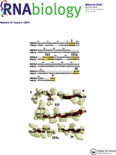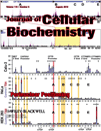
CELL CYCLE
Scope & Guideline
Pioneering Discoveries for Tomorrow's Biological Challenges.
Introduction
Aims and Scopes
- Cell Cycle Regulation and Mechanisms:
Research articles frequently explore various aspects of cell cycle control, including the roles of cyclins, cyclin-dependent kinases (CDKs), and checkpoint proteins in normal and cancerous cells. - Molecular Mechanisms in Cancer:
The journal emphasizes studies that investigate the molecular underpinnings of cancer progression, metastasis, and resistance to therapies, often focusing on key signaling pathways and regulatory networks. - Role of Non-Coding RNAs:
There is a significant emphasis on the functions of long non-coding RNAs (lncRNAs) and microRNAs in regulating gene expression related to cell proliferation, differentiation, and apoptosis in various cancer types. - Therapeutic Strategies and Drug Resistance:
Papers often discuss novel therapeutic approaches, including targeted therapies and the mechanisms of drug resistance, highlighting the significance of understanding cellular responses to treatments. - Cellular Stress Responses and Aging:
Research on cellular responses to stress, senescence, and their implications in aging and age-related diseases are also core areas of focus.
Trending and Emerging
- Integrative Omics Approaches:
The use of multi-omics strategies, including genomics, transcriptomics, and proteomics, is gaining traction, providing comprehensive insights into the regulation of cell cycle processes and cancer biology. - Microenvironmental Influences on Cell Cycle:
There is an increasing focus on how tumor microenvironments affect cell cycle regulation, including the role of stromal interactions and extracellular matrix components in tumor progression. - CircRNA Research:
The investigation of circular RNAs (circRNAs) as regulatory molecules in the cell cycle and cancer has emerged as a significant theme, with studies exploring their potential as biomarkers and therapeutic targets. - Targeted Therapy and Immunotherapy:
Research on targeted therapies and immunotherapies is expanding, particularly studies that elucidate how cell cycle regulation affects treatment responses and resistance mechanisms. - Cellular Senescence and Aging:
An increasing number of articles focus on the role of cellular senescence in cancer biology and aging, exploring how senescence influences tumorigenesis and response to therapy.
Declining or Waning
- Basic Cell Cycle Studies:
There has been a decline in publications focusing solely on fundamental aspects of the cell cycle without direct implications for cancer or therapeutic intervention, as more studies aim for translational relevance. - Traditional Cancer Biomarkers:
Research centered solely on established cancer biomarkers is decreasing, with a shift toward identifying novel markers and understanding their functional roles within complex regulatory networks. - In vitro Models:
There is a marked reduction in studies employing basic in vitro models for cell cycle research, as the field increasingly favors more sophisticated in vivo and multi-dimensional models that better mimic the tumor microenvironment. - Single Pathway Analysis:
The trend has shifted away from isolated studies of single signaling pathways, with more research focusing on integrative approaches that consider multiple pathways and their interactions.
Similar Journals

SEMINARS IN CELL & DEVELOPMENTAL BIOLOGY
Pioneering Research for a Deeper Biological InsightSEMINARS IN CELL & DEVELOPMENTAL BIOLOGY is a premier journal published by Academic Press Ltd - Elsevier Science Ltd, focusing on the vital domains of cell and developmental biology. With an impact factor that reflects its rigorous contributions to the field, this journal embodies the highest standards of academic excellence, currently ranking in the Q1 quartile for both Cell Biology and Developmental Biology categories as of 2023. Researchers and practitioners will appreciate its robust Scopus ranking, placing it within the top tiers of developmental biology and cell biology, with percentile ranks of 94th and 90th respectively, showcasing the journal's influential presence in the scientific community. The journal aims to disseminate comprehensive reviews, cutting-edge research articles, and significant advances in the understanding of cellular mechanisms and developmental processes, thereby catering to a diverse audience that includes researchers, scholars, and students dedicated to the life sciences. Given its commitment to open access, SEMINARS IN CELL & DEVELOPMENTAL BIOLOGY promotes widespread dissemination of knowledge, enhancing collaborative research efforts and driving innovation across biological disciplines.

RNA Biology
Connecting Discoveries in RNA BiologyRNA Biology is a premier journal published by Taylor & Francis Inc, focusing on the intricate and evolving field of RNA research. With an ISSN of 1547-6286 and E-ISSN of 1555-8584, this journal has established itself as an essential resource for professionals, researchers, and students engaged in both molecular and cell biology. Recognized in the 2023 quartile rankings, RNA Biology holds a distinguished Q1 category in Molecular Biology and a Q2 category in Cell Biology, indicative of its significant impact and reputation within the scientific community. The journal emphasizes the importance of RNA in various biological processes, highlighting both fundamental and applied aspects, which is crucial for advancing our understanding of gene expression and regulation. With a strong Scopus ranking, including Rank #105/410 in Molecular Biology and Rank #83/285 in Cell Biology, RNA Biology is not just a publication but a vital platform for sharing groundbreaking findings and insights into RNA research. With a convergence that spans from 2004 to 2024, the journal promises to continue its legacy of excellence in disseminating important discoveries in RNA science, contributing richly to ongoing scientific dialogue and innovation.

Cell Division
Exploring the intricacies of cellular mechanisms.Cell Division, an esteemed journal published by BMC, serves as a critical platform for researchers in the fields of biochemistry, cell biology, and molecular biology, showcasing groundbreaking studies and novel insights in the mechanisms governing cell division. Since its establishment in 2006, this Open Access journal, based in the United Kingdom, has strived to promote rigorous scientific discourse, ensuring unrestricted access to its rich content. With a commendable impact factor reflected in its Q1 and Q2 categorizations across various biological disciplines, Cell Division is recognized for its influence and relevance in the academic community. Targeting professionals, researchers, and students alike, it aims to disseminate high-quality research findings that further our understanding of cellular processes and contribute to advances in medical and biotechnological applications. Engage with leading-edge research and broaden your knowledge base in cell biology through this dynamic publication that continues to evolve through 2024 and beyond.

Molecular Cell
Advancing the Frontiers of Cell and Molecular Science.Molecular Cell, published by Cell Press, is a leading journal in the fields of cell biology and molecular biology. Established in 1997, this prestigious journal boasts a significant impact within the scientific community, evidenced by its impressive 2023 Scopus rankings, placing it in the top 2% of its field (Rank #10/410 in Molecular Biology, Rank #12/285 in Cell Biology). With a focus on cutting-edge research that bridges the gap between molecular genetics and cellular function, Molecular Cell serves as an essential platform for the dissemination of vital findings and innovative methodologies. Although it follows a traditional publishing model without Open Access options, its rigorous peer-review process and high standards ensure that articles published within these pages are of the utmost quality, making it an invaluable resource for researchers, professionals, and students alike seeking to stay at the forefront of scientific discovery. The journal's address is 50 Hampshire St, Floor 5, Cambridge, MA 02139, United States, reinforcing its commitment to fostering scientific excellence and collaboration.

Cell Reports
Fostering Collaboration for a Healthier TomorrowCell Reports is a prestigious open-access journal published by CELL PRESS that has firmly established itself as a leading voice in the fields of Biochemistry, Genetics, and Molecular Biology. Since its inception in 2012, the journal has provided an innovative platform for rapid dissemination of cutting-edge research, ensuring that high-quality findings are accessible to a global audience. With an impressive impact factor and ranking within the top 10% in its category, as reflected by its Q1 ranking in Scopus, Cell Reports serves a vital role in advancing scientific knowledge and fostering collaboration among researchers. The journal's commitment to the open-access model not only enhances visibility but also encourages the sharing of critical advancements in molecular biology. Situated in the Netherlands, its contributions are recognized worldwide, making Cell Reports an indispensable resource for scientists aiming to stay at the forefront of their fields and facilitate breakthroughs that may shape the future of biomedicine.

BIOCELL
Exploring the Depths of Biochemistry and GeneticsBIOCELL is a distinguished peer-reviewed journal dedicated to the field of Cell Biology, published by TECH SCIENCE PRESS. Since its inception in 1995, the journal has been at the forefront of disseminating innovative research, with converged publication years extending from 1995 to 2013 and from 2015 to 2024. Although it currently holds a Q4 ranking in the Cell Biology category according to the 2023 category quartiles, BIOCELL aims to foster advancements by providing a platform for researchers, professionals, and students to share their findings in biochemistry, genetics, and molecular biology. The journal is available in both print (ISSN: 0327-9545) and digital formats (E-ISSN: 1667-5746) and seeks to attract contributions that enhance scholarly dialogue and understandings of cellular mechanisms and innovations. With a commitment to quality research and critical discourse, BIOCELL plays an important role in nurturing the scientific community within Argentina and beyond, offering vital insights that contribute to the advancement of the life sciences.

Journal of Cell Communication and Signaling
Pioneering Insights into Signaling MechanismsThe Journal of Cell Communication and Signaling is a prestigious academic journal published by Springer, focused on advancing the understanding of cellular communication mechanisms and signaling pathways. Since its inception in 2007, this journal has established itself as a leading platform in the field, with a strong impact reflected in its 2023 categorizations: Q1 in Biochemistry, Q2 in Cell Biology, and Q2 in Molecular Biology. Researchers from around the globe rely on its rigorous peer-reviewed articles to gain insights into the complex molecular dialogue that underpins various biological processes. With an ISSN of 1873-9601 and E-ISSN of 1873-961X, the journal is committed to disseminating high-quality research that informs both academic studies and practical applications in biotechnology and medicine. Although not an open access publication, it provides essential resources tailored for professionals, students, and researchers, enhancing their knowledge of critical signaling pathways that drive health and disease. The journal is located in the Netherlands, at VAN GODEWIJCKSTRAAT 30, DORDRECHT, and stands out in the field, boasting impressive ranks among its peers in the Scopus database.

JOURNAL OF BIOLOGICAL CHEMISTRY
Advancing the Frontiers of Biochemical ResearchJOURNAL OF BIOLOGICAL CHEMISTRY, published by Elsevier, is a premier interdisciplinary journal dedicated to advancing our understanding of biochemistry, cell biology, and molecular biology. With a prestigious history dating back to 1945 and an impressive convergence of research expected to continue through 2024, this journal holds a Q1 ranking in all three of its core categories, signaling its critical influence in the respective fields, supported by a robust Scopus ranking that places it among the top echelons of internationally recognized research. Although currently not available as Open Access, the journal is essential for researchers and professionals looking to stay abreast of the latest breakthroughs and innovations in biochemical research. With a deep commitment to scientific rigor and a focus on diverse topics ranging from cellular processes to molecular mechanisms, the Journal of Biological Chemistry serves as a vital resource for the academic community, shaping the future of biological sciences.

CELL BIOLOGY INTERNATIONAL
Unveiling the Mysteries of Cellular MechanismsCELL BIOLOGY INTERNATIONAL is a prestigious academic journal dedicated to the rapidly evolving field of cell biology, publishing high-quality research aimed at understanding cellular processes and their implications in various biological contexts. Published by Wiley, this journal has established its relevance with an H-Index that reflects its robust citation impact and a commendable Scopus Rank of #111 out of 285 in the field of Biochemistry, Genetics, and Molecular Biology, positioning it in the 61st percentile. Although it operates under a traditional subscription model, its influential insights are crucial for researchers, professionals, and students alike who are seeking cutting-edge developments in cellular mechanisms and their applications in medicine. The journal spans contributions dating back to 1993, providing a rich archive of knowledge that continues to shape the discourse within the scientific community. With a strong category ranking of Q3 in Cell Biology and Q2 in Medicine (miscellaneous) as of 2023, CELL BIOLOGY INTERNATIONAL stands as a reliable platform for disseminating transformative science in the cellular domain.

JOURNAL OF CELLULAR BIOCHEMISTRY
Transforming Knowledge into Breakthroughs in Cellular BiochemistryJournal of Cellular Biochemistry is a premier academic journal dedicated to advancing the field of biochemistry and cellular biology. Published by Wiley, this influential journal has a significant impact factor that underscores its relevance and authority within the scientific community. With its ISSN 0730-2312 and E-ISSN 1097-4644, the journal has been on the frontier of research since its inception in 1982, and is expected to continue publishing cutting-edge studies through 2024. As evidenced by its ranking in the 2023 Scopus Quartiles, it holds a rank of Q2 in Biochemistry and Q3 in both Cell and Molecular Biology, placing it among the top tiers of scientific journals in these disciplines. The Journal of Cellular Biochemistry serves as a vital resource for researchers, professionals, and students alike, providing a platform for the dissemination of innovative ideas and findings that shape our understanding of cellular processes and biochemical pathways. Though it does not currently offer Open Access options, its robust peer-review process ensures that each publication meets the highest academic standards, thus solidifying its esteemed position in the landscape of biochemical research.